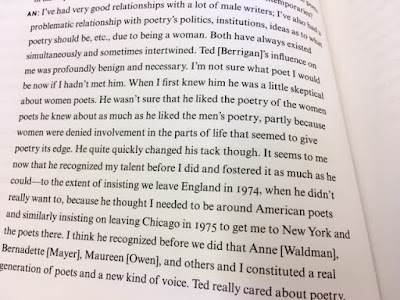EILEEN TABIOS Engages
WHAT IS POETRY? (JUST KIDDING, I KNOW YOU KNOW): Interviews From the
Poetry Project Newsletters (1983-2009) edited by Anselm Berrigan
(Wave Books,
Seattle/New York, 2017)
The subtitle speaks for itself. Entonces, how does one
“review” 416 pages of poet interviews? The poets are asked about their work,
how they do the work, what inspires the work, their opinions on other works and
poets, and so on. When I note “review,” I mean to critique. But is criticism
possible? A poet said I lived/live and wrote/write in a particular way. What’s
to criticize?
Criticism would be more applicable, it seems to me, to the
results of how the poets lived/live and wrote/write. But this book is not an anthology of actual
poems. My review—rather, engagement—then
must become (also) me talking about me—i.e., I’ll be highlighting below certain
sections that snagged my attention as
a reader.
But what I can also say, though, is that I strongly
recommend this book—it is well-edited (and/or perhaps the interviews originally
were well-written) so that the prose flows; it is educational; it is
interesting; in places it is funny; in places it’s gossipy (in a fun way); and
it succeeds in presenting a profile of The Poetry Project that makes the reader
applaud its existence (I followed the editor Anselm Berrigan’s suggestion to read the thing chronologically from first to last page). Interestingly, I didn’t get a lot of angst
from the 416-page tome—aren’t poets supposed to be angst-sy? But perhaps this
wasn’t the place for angst, and I actually like this—from this project, I
mostly glean a seriousness in purpose and I appreciate such. So here are a few of
the (many) excerpts that snagged my attention—the variety, I believe, attests
to the wide expanse of the covered material.
Different readers no doubt would choose different excerpts, have their
attention snagged more by other bits, but the point is that this book has
something attention-worthy for a wide variety of readers.
First is this excerpt from Judith Goldman’s interview of
Alice Notley. In this excerpt, Notley discusses the influence of her husband
Ted Berrigan (click on all images to enlarge):
I was a bit astounded (impressed) by Berrigan’s decisions as
described above as regards moving back to the U.S. and then moving from Chicago
to New York because he thought Notley “needed to be around American poets” and
that he identified how Notley, Anne Waldman, Bernadette Mayer, Maureen Owen and
others “constituted a real generation of poets and a new kind of voice.” It’s not
just that Berrigan had the prescience to make the identity—it’s that he pushed
for doing what he thought was required to support Notley’s development. If I’d
married a poet, I’d hope to have that kind of support for my work …
Second excerpt is from Magdalenza Zurawski’s interview of
Renee Gladman, the section where Gladman is asked what got her “interested in
the avant-garde”:
The third excerpt is from Dale Smith’s interview of Lorenzo
Thomas, focusing on Leni Riefenstahl:
I think it’s always worthwhile to consider the tension
between the creator and the created, the author and the author’s work—I, for
one, find it difficult to generalize an approach to the topic and note that
Thomas, too, says later on in the interview after the above excerpt: “How much
of the idea does the technique reflect and vice versa? I don’t know the answer
to that. I wouldn’t even speculate. Each case is different. There is an answer
there but I jut don’t know enough yet to frame one.”
The fourth excerpt is from Lisa Jarnot’s interview of Stan
Brakhage. Here, Brakhage is discussing Robert Duncan’s infatuation with Helen
Adam, but I was struck by what he shared to be Duncan’s and his partner Jess’s
view of the moon landing:
When I read the above, I paused for a while, considering how
Duncan’s privileging of the imagination made him view the moon landing as a
desecration rather than an opening up to the possibilities of (future) space
travel. So much, after all, has been imagined about what’s out in space …
The fifth excerpt is from Lisa Jarnot's interview of John Godfrey:
I note the Godfrey excerpt because the effect of teachers should always be appreciated. In fact, reading this made me remember my English teacher at Peary Junior High, Mr. Mildner, and journalism teacher at Gardena High, Mr. Ford. Both teachers encouraged and supported my early writing efforts. Thank you, gentlemen, across the years ...
The sixth and seventh excerpts I share are both from Greg
Fuch’s interview of Eileen Myles. Here’s
the fifth:
In photographing the excerpt, I actually laid nearby pieces
of paper on the page to focus on what Myles is sharing about her “fiftieth
year.” It resonates as I’m at this stage—and it is so true: by this age, if
you’ve been writing for a while, you have a body of work that you now can dip
into and re-orient or recontextualize into new work. I don’t get the root
canal, but I do get the “like being dead.” Just sayin’.
The seventh excerpt seems like a great way to end my list of
samplings from the book. Here’s Myles again:
Simply, isn’t the above fabulous?! And therein lies yet another reason to read WHAT IS POETRY?... It illustrates
why writers “ought to write for openings that aren’t there.” That seems like a
good answer to a different but related question, “What is poetry for?”
*****
Eileen Tabios is the editor of Galatea Resurrects. Her 2017 poetry releases include two books, two booklets and five poetry chaps. She also edited the anthology PUNETA: Political Pilipinx Poetry. More info at http://eileenrtabios.com








Another view is offered by T.C. Marshall in GR's Dec. 19, 2017 issue:
ReplyDeletehttp://galatearesurrects2017.blogspot.com/2017/12/what-is-poetry-just-kidding-i-know-you.html
I hadn't seen your approach till mine got published an I saw the note about yours. I quite like your approach and find it complementary.
ReplyDeleteThanks T.C. I think we did well by this book. :)
ReplyDelete